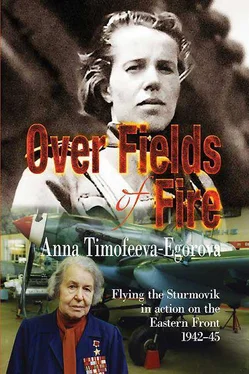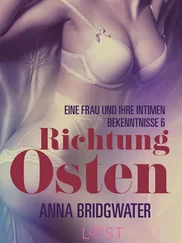Anna Timofeeva-Egorova
OVER FIELDS OF FIRE
Flying the Sturmovik in Action on the Eastern Front 1942–45

1. Led astray by a rainbow
I’d made my choice — I was going to be a professional pilot! Nothing else would do! One cannot split oneself into two halves, one can’t give one’s heart to two passions at once. And the sky has a special claim on one, completely engaging all one’s emotions…
I remember the send-off as a bright sunny festival, although the day was quite likely to have even been overcast. But… my friends’ smiles, laughter and jokes — all this so dazzled me and so turned my head, and my joy, overfilling me, so fogged my vision… When the train had taken off I, by now on the carriage platform, stared ahead for a long time, blinking with half-shut eyes, failing to make anything out…
In Ulyanovsk, I rushed straight from the train station to the Venets 1 1 Translator’s note — lit. ‘crown’.
— the highest spot above the Volga. And such an inconceivable space opened up before me from up there, such an expanse that it took my breath away! Here it was before me — the mighty Russian river that had given Russia the bogatyrs 2 2 Translator’s note — Mediaeval warrior heroes comparable with West European knights-errant.
… And what a wonder, above the Volga covered by young December ice, a rainbow began to shine. It threw its multicoloured yoke from one bank to the other across the whole blue sky — and this in the wintertime? Yet maybe I had just imagined it? But I was already laughing loudly, sure that it was a rainbow, and that it was a sign of luck. Again just like back at the Kazan train station in Moscow, waves of joy were coming from my chest and their splashes were curtaining the horizon with a rainbow mist. It had been no easy ride — exams passed brilliantly, approval given by a nitpicking medical board — and I had been enrolled as a flying school cadet!
…We had already been issued with uniforms: trousers, blouses with blue collar patches, boots with leggings. It seemed I had never worn a better outfit in my life although it was obviously a bit big for me. In a word I liked everything in the school from reveille and the physical exercises up to marching with a song before bedtime. We studied a lot. I did well in the classes. But once… I still see that day as a terrible dream.
“Cadet Egorova! The school commander’s calling you.”
When I entered the office and reported as one should, everyone sitting at the table met me with silence and just stared at me gloomily. I remember standing at attention and waiting.
“Do you have a brother?” I heard someone’s voice, and answered:
“I have five brothers.”
“And Egorov Vasiliy Alexandrovich?”
“Yes, he’s my elder brother.”
“So why have you concealed the fact that your brother is an enemy of the people 3 3 Translator’s note — a common designation for people subjected to repression during Stalin’s purges.
?”
For a moment I was taken aback.
“He’s not an enemy of the people, he’s a Communist!” I shouted in anger, wanted to say something else, but my throat dried up straightaway and only a whisper came out. I could no longer see the faces of those sitting in the office and heard little — only my heart throbbing stronger and stronger inside my chest. It seemed that my brother was in trouble and I knew nothing about it… From somewhere I heard, like a sentence:
“We are expelling you from the school!”
I don’t remember leaving the office, changing into my civilian clothes in the cloakroom, the gates of the flying school shutting behind me. They had taken the sky away from me… That rainbow had led me astray… I hadn’t found happiness… And again I found myself on a steep river bank, but this time not up on the Venets but far out of town. I searched through my pockets, found my passport, Comsomol 4 4 Translator’s note — Young Communist League.
membership card, a small red certificate with the Metro emblem on the front — the Government’s token of appreciation for my participation in the first stage of the Moscow Metro construction. That was all I had.
In agonising torment and anxiety I decided to go to see my mother in the village. There, in my native land of Tver I would be always understood and supported. But I suddenly thought: I haven’t even got a kopeck — not even enough for a passage ticket. And then I headed for the City Comsomol Committee…
Basically our village of Volodovo, lost in woodland between Ostashkovo and ancient Torzhok, had only one street. By 1930 it had only 45 houses. In summer everyone went to pick mushrooms and berries in the forests and coppices of Glanikha and Mikinikha, in Zakaznik and up on Sidorova Hill. But the main occupation of many generations in our land was flax. When it was in blossom it was impossible to tear your eyes away from the blue sea, and when it ripened it would become a sea of gold! And what great air there was in the many-grassed fields and meadows! And how crystal clear the springs were in Veshnya and Pestchanka, Lotky and Yasenitsa!
After I finished year four of the Sidorovskaya village school my mother decided to send me away to Torzhok and enroll me in a gold-embroidery school. But in a week I began to ask to go home for I understood that I would be unable to sit all day long over embroidery. I had understood even with my child’s mind that one has to have to have a vocation for such a craft. They didn’t make a gold embroiderer of me. But there was no place to continue my education, for there was no secondary school in our area and my elder brother decided to take me to Moscow.
I liked it at my brother’s, especially the warm arms of one-year old Yurka. He wouldn’t let me away from him day or night, and if I chanced not to be next to him he would begin crying so, that he awoke everyone in the apartment. I didn’t go to school for I had a headstart on studies by two months. I went for walks with Yurka, with children from our courtyard in Kourbatovskiy Lane, helped at home, and ran to the bakery to buy bread.
In the winter they set up a skating rink in our courtyard. With home-made wooden skates tied with strings to our valenki 5 5 Translator’s note — felt boots.
we managed to trace out some kind of figures on the ice. I happened to be at the circus when Grandfather Dourov 6 6 Translator’s note — a famous animal trainer.
performed in person. My brother took me once to the Bolshoi Theatre. I remember that the opera Prince Igor was on and I remembered Prince Igor’s aria for the rest of my life.
Looking ahead somewhat I recall that once I would have to listen to this aria as a POW of the Germans. An Italian POW named Antonio would sing it until he was shot dead by the Hitlerites… Years later when my second son was born I would call him Igor…
Thus, with all the variety, discoveries and delights of early teenage life my first Moscow winter went by. The next summer Yurka and I were sent to the village. It turned out that at long last they had opened a seven-year school in Novo village and it was decided that I would go there to study. The new school was a seven-year CYS 7 7 Country Youth School.
and I entered Year 5 there. Seven kids from our village went there. Every day we had to cover five kilometres there and five kilometres back — in frost, under rain, on roads covered by snow and through impassable mud. Only two of us stayed on till year 6: Nastya Rasskazova and I.
Читать дальше













